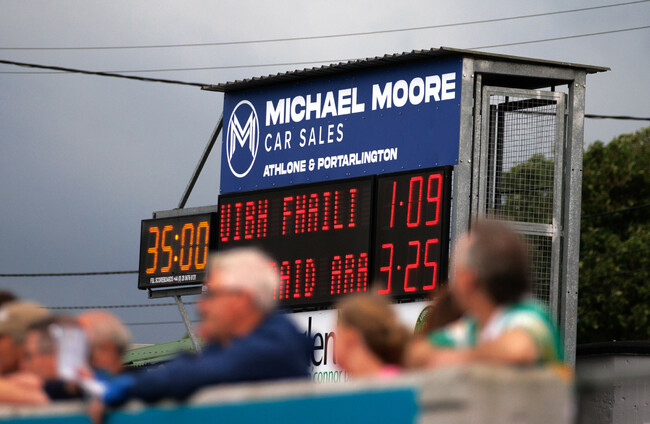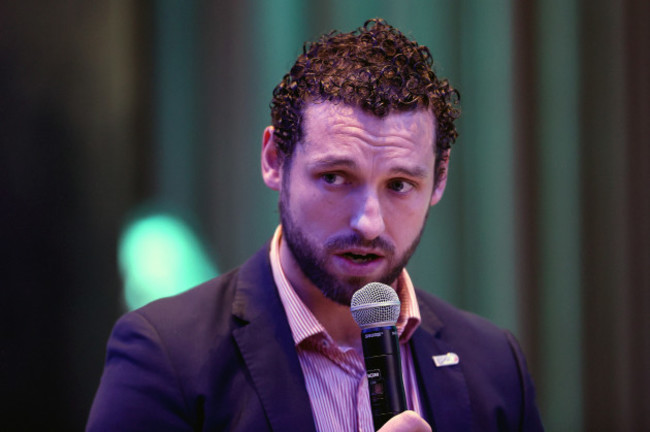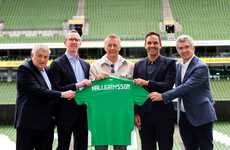DÓNAL ÓG CUSACK spoke on behalf of hurling’s second-tier counties when he accused the GAA of failing the game this summer.
“Carlow should have been left enjoy their Joe McDonagh win and prepare for next year. There’s no point bringing them into championship like that, not to mention Offaly,” he said.
His plea was sparked by the 32- and 10-point defeats dished out to those counties in the All-Ireland preliminary quarter-finals.
“Our biggest problem is we can’t spread the game outside of those big counties and I would say the GAA has failed hurling.”
"I would say the GAA has failed hurling"
— The Sunday Game (@TheSundayGame) June 17, 2023
Dónal Óg Cusack discusses the inability to spread hurling to counties beyond the elite #SaturdayGame #RTEGAA pic.twitter.com/6d9ExHLZII
On Saturday, the second-tier counties had their say. Joe McDonagh Cup finalists will continue to play in the MacCarthy Cup preliminary quarter-finals after Special Congress delegates voted down a motion seeking to end the practice.
The outcome didn’t so much lay bare the competing visions for the future direction of hurling, but exposed the lack of any coordinated vision for the game’s development.
The GAA continues to fail hurling through indecisive and haphazard thinking.
The players have had their say via the GPA. Of the nine counties who have competed in the Joe McDonagh, 74% rejected the motion to sever the link to the All-Ireland knockout stages.
Even among the Offaly panel – hockeyed out the gate with a record 7-38 concession against Tipperary – seven in every 10 players still opposed the game’s removal.
Their manager Johnny Kelly took aim at the League and provincial structure instead.
“If they want a broader range of counties competing, they really have to open their eyes and look at that League. A yo-yo effect isn’t going to help anyone.
“Even though we got beaten today, so be it. Wouldn’t it be better to play against them next year and see can we close that gap?
“If it’s a 20-point gap, let’s bring it back to 10, but you won’t do it every two years. It’s not going to happen unless we get consistent games against the top teams.”
Counties need the right mix of big days out and realistic steps forward.
As Kerry selector Pat Bennett said last year: “We want to get the hammerings”.
They lost to Wexford by 21 points in their preliminary quarter-final. “We got bet but the boys loved it. This is where we want to be. These are the teams we want to play. 4,500 below in Austin Stacks. That is how you are going to do it and build it.”
GPA CEO Tom Parsons summed up the feedback: “The argument can be made that the preliminary quarter-finals have done nothing for the development of hurling. If that is the reason for supporting this motion, I would ask what does this motion do for the development of hurling? The answer is nothing.”
The implied vision behind the GAA proposal was that the second-tier competition could be given the oxygen of a longer summer run.
A Joe McDonagh final could take a plum date around the final weeks of the hurling championship, maybe even as an All-Ireland final curtain-raiser now that slot is available.
That said, the Christy Ring, Nicky Rackard, and Lory Meagher Cups don’t have the deadline pressures of a preliminary quarter-final date and they were all run off by the first Sunday in June. Are all GAA units serious about advocating for a full calendar of games for their players across both codes or running the hurling off quickly to prioritise time and expenditure into football?
Either way, the rejection means the Joe McDonagh will be shoehorned in once again in 2024.
This year, Offaly had to play seven games in seven weeks after winning Division 2A of the Hurling League.
Runners-up Kildare, the most recent feelgood story for hurling development, were so gassed out by their week-on-week schedule they got relegated back to the third-tier Christy Ring Cup. How much will that delay their progress?
The seeds of the problems that will sprout up again in TV debates six months down the line are being planted now.
The inaction in the boardroom is mirrored by the lack of action on the field in a county like Kerry.
As Joe McDonagh Cup runners-up for three years in a row, they should be fast-tracking for the step up. This year, they bowed out on 13 May. Their club championship was over by 6 August.
With the exception of a Munster campaign for their county champions in November, Kerry’s players will go six months without a competitive game of hurling at club or county level.
Laois manager Willie Maher this spring described his new charges as “years behind” in strength and conditioning.
His predecessor ‘Cheddar’ Plunkett was realistic when describing the difficulty in keeping those players to a year-round conditioning programme when the season is so short and the gap between club and county preparation so vast.
Hurling League reform is now being considered just five years after the GAA jettisoned a far more entertaining and egalitarian structure. A return to that previous meritocracy is under consideration but it is done so in a vacuum.
The GAA’s restructures ought to take a global perspective rather than view each problem in a silo. Otherwise, their approach will continue to be characterised by U-turns and rejected votes, while hurling remains a minority sport in two-thirds of the country.











The peverbial game of 2 halves . Great 2nd half . COYS
@Sean Nihill: French clubs are so flakey. Have they ever beaten an English club in the last 10 years? 1-0 up at half time, Spurs lose Son and yet Marseille bottle it. Apart from PSG, the French League is a bit of a joke when it comes to CL.
@Tommy Bohan: I seem to remember Lyon dumping Man City out of the competition in the QF a couple of years ago.
@Tommy Bohan: Tommy there with your best Paul Merson impression.
Good laugh of a Wednesday morning – thanks
Absolutely gutted Spurs scabbed another jammy enough win, even tho it was a stunning goal from Hojberg. Nonetheless, the night isn’t about them but the mighty Adler from Frankfurt. Had to go to Lisbon and win tonight no matter what the other result was. A team that even I feared for ahead of the season’s start, but boy have they impressed. Not least lacking the player quality other team’s in the group harbour, but also completely financially inferior to the likes of Spurs. Came within seconds of winning the group too. Massive for a club run by fans with over 100,000 members. Huge for the German game too. So proud of Glasner and his men.
@Ultan Corcoran: Nice to read a post from an Irish person with some European knowledge and not one of the typical followers of English teams.
@Tommy Bohan: Resident expert..
@Tommy Bohan: Haha appreciate it Tommy. Nothing much against the English teams themselves, just prefer the game elsewhere. Try to keep a broad understanding of all football affairs if I can!
@Gary Donlan: That’s a very bland, general comment. Could you please expand on it?
@Tommy Bohan: i will. To regular readers on here, Ultan is said resident expert on German football. Gives a very informed and impassioned view on Der Bundesliga which is widely appreciated by many.
@Tommy Bohan: Ultan is well versed in all things German football, Tommy, I think is the gist of what Gary was getting at. Not sure about the claim to a broad understanding of football in general though, as that would lead to a knowledge that Spurs were utterly robbed last week by another absolute varce, fully deserved to go through and there was nothing scabby about it. He seems like a sound oul head though all the same, with an intricate knowledge of German football, especially Dortmund, where it wouldn’t surprise me if he knew the names of each of the squad’s respective pet hamsters.
@Gary Donlan: Apologies for that, didn’t get what you meant first time. As I said it’s nice to hear a different viewpoint.
@Stiofán Ó’Murchú: Hahahaha love that last bit. Ahhh I’ll be the first to admit I’ve a bit of a chip on my shoulder about Spurs. Since that UCL knockout tie a few years back and a couple hundred fans chanting ‘no German bombers’ in the square. That along with the big multi-million stadium stuff rubbed me up the wrong way. As for the scabby stuff it was unnecessary.. I just heard they’d been a bit lucky in recent weeks through mates who follow the prem. Probably isn’t the case. Best of luck to them and I enjoy watching their Bundesliga players like Son and Hojberg… who knows, could be another BVB – Spurs R16 post Christmas ;)
@Ultan Corcoran: arsenal fan ?
@Jim Casey: I like Arsenal but nope, nobody in England but if it push came to shove right now it be Leeds! It was obviously just a few hooligans involved anyway… I’m sure the greater spurs consensus are a good lot. I know a good 6-7 fans of them here and all a sound bunch.
Well that was exciting!!! COYS
sure where is the fun in doing it the easy way. Delighted…coys
But my god we really need to get this out-ball sorted, no connection between attack and defence. 2nd half was way better but only reason Spurs found themselves getting forward so much more is because of Marseille’s desperation at the other end. Anyway, we keep movin’ and prayin’ on the injury front
Lads, it’s spurs
@Aidy McBride: Grow up.
@Aidy McBride: Save it for Thursday night.
@Aidy McBride: c’mon Aidy this dark side to you isn’t going to well. Always thought you better than this.
@Aidy McBride: I’m worried about you
@Denis Ryan: all together now.
Oh what a night, watching football on a Tuesday night,
You play Thursday cos you’re……….
What a feeling, what a night